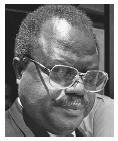SOLOMON ISLANDS
Allan Kemakeza
Prime Minister

(pronounced "A-len KEE-mah-KEE-zah")
"The times ahead are not going to be easy. These will be times of sacrifice. But we can be comforted in our faith in our Lord, that with him all things are possible but without him nothing is possible."
Lying to the east of Papua New Guinea, the Solomon Islands are a scattered double chain of islands, forming the third largest archipelago in the South Pacific. The land area totals more than 27,500 sq km (10,640 sq mi) spread over 1.35 million sq km (521,235 sq mi) of ocean. Volcanic action produced many of the islands, including the largest—Guadalcanal, Malaita, New Georgia, Santa Isabel, Makira, and Choiseul. Such seismic disturbance, including two submarine volcanoes in the Western Province, continues to the present day. There are also coral atolls of varied size. Altogether, the country consists of more than 900 islands, 347 of which are populated.
Population was estimated at 494,786 in 2002. Until the mid-1980s, Malaita was the most populated island. Since then, there has been considerable immigration to the capital, Honiara; Guadalcanal now boasts the largest number of residents. Though overall population density (16.6 per sq km) is one of the lowest in the Pacific, it is unevenly distributed, and the smaller eastern atolls are crowded. The annual growth rate of 2.9%, could aggravate the problem for the entire nation. More than 93% of Solomon Islanders are ethnically Melanesian. Slightly less than 4% are Polynesian. From 1955 to 1971, the ruling British government moved people from what were then the Gilbert Islands (now Kiribati) to ease overcrowding; there are some 4,000 Gilbertese presently living in the Solomons. The remainder of the population is of European or Chinese ancestry.
More than 90% of Islanders are Christian but speakers of the Kwaio language on Malaita still proudly identify themselves as "pagan." The Anglican Church of Melanesia claims the most members, and there is a substantial number of Catholics, Seventh-Day Adventists, Methodists (United Church), and followers of the South Seas Evangelical Church. More than 80 indigenous languages and dialects are spoken, most of them of the widespread Austronesian language stock. Although English is the official language, the Solomon Islands Pijin is the most widely understood.
Like many Pacific Island nations, the Solomon Islands are heavily dependent on foreign aid, with Japan being the largest donor. Government expenditures are regarded as excessive, and estimates of national debt range between US $170–200 million. Serious efforts have been made in recent years to bring financial well-being to the country. One encouraging sign is the Gold Ridge mine which completed its first year of full operations in 1999. Logging continues to be a problem. Carried out by foreign firms, levels of deforestation are not sustainable. The country continues to have a very poor record of providing services to the people; literacy and health statistics are among the worst in the Pacific. The official currency is the Solomon Islands dollar.
PERSONAL BACKGROUND
Kemakeza was born in 1951 on Savo Island. He attended religious primary schools and joined the Royal Solomons Islands Police force in 1972. He trained in policing in the United Kingdom and in Australia. In 1988 he had achieved the rank of Assistant Superintendent. He entered politics in 1989, running for Parliament from his native Savo as a member of the PAP, a seat he held until becoming prime minister in 2001.
ADDRESS
Office of the Prime Minister
Honiara
Solomon Islands